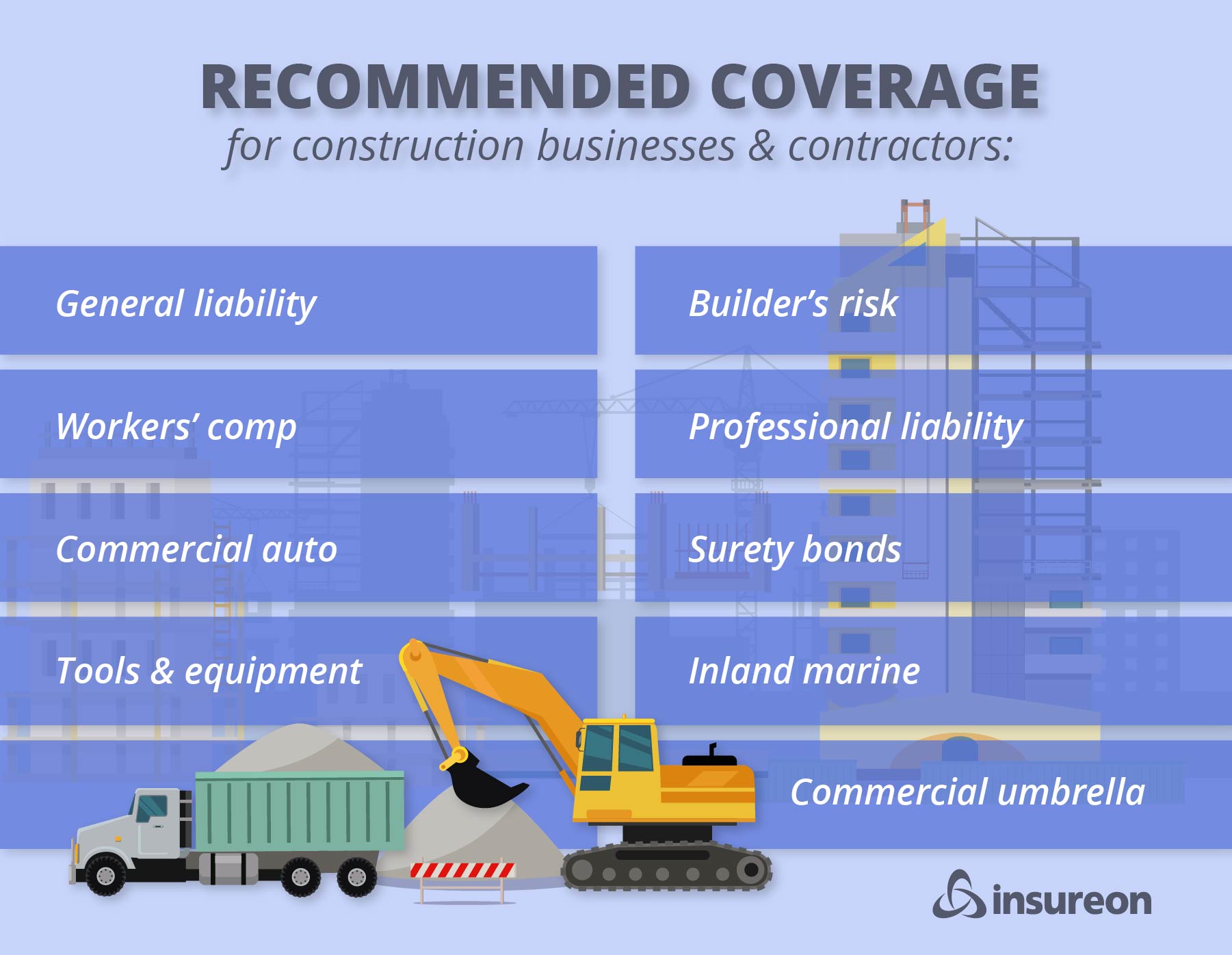
Top construction contractors we insure
Recommended insurance policies for construction businesses and contractors
Insurance can help your business recover from lawsuits, injuries, and theft. Meet your state's requirements and find peace of mind with the right policies for construction companies and contractors.
General liability insurance
A commercial general liability policy covers basic risks in the construction industry, such as accidental damage to a client’s property. Bundle it with property insurance for savings in a BOP.
- Customer bodily injuries
- Damaged customer property
- Product liability insurance
Business owner's policy
A business owner's policy, or BOP, bundles general liability coverage and commercial property insurance at a discount. It protects against common lawsuits and property damage.
- Accidents that injure clients
- Client property damage
- Damage to your building or its contents
Workers’ compensation insurance
Most states require workers' comp for construction companies that have employees. It also protects sole proprietors from work injury costs that health insurance might deny.
- Employee medical expenses
- Disability benefits
- Lawsuits from work injuries
Commercial auto insurance
This policy for construction businesses and contractors can pay for property damage and medical bills in an accident. It can also cover vehicle theft, weather damage, and vandalism.
- Car accidents
- Vandalism and theft
- Weather damage
Contractor’s tools and equipment insurance
This policy covers your construction tools and equipment wherever you bring them, including while they are in transit or at a jobsite. The items generally must be valued under $10,000.
- Equipment less than five years old
- Mobile equipment
- Small tools
Professional liability insurance
Professional liability insurance for contractors, also called errors and omissions insurance (E&O), covers financial losses when a construction error or oversight leads to a lawsuit.
- Accusations of negligence
- Failure to complete construction
- Failure to use promised materials
How much does insurance cost for construction businesses?

Several factors will have an impact on the pricing of construction insurance policies, including:
- Services offered, such as carpentry, excavation work, or painting
- Business equipment and property, such as backhoes, forklifts, and bulldozers
- Whether you do commercial or residential work
- Business revenue
- Location
- Number of employees
- Types of insurance coverage purchased

Every customer has a story to tell
Meet Nathaniel Muhammad, a general contractor and small business owner born and raised in Chicago.
Learn about how he started his business, the passion that drove him to pursue his dream, and how Insureon has helped him protect it with the right policies.
There's a picture that they share on social media like where it says, "The road to success". and it's a torn-up road. There's no shortcuts. It's all about falling and getting back up and falling and getting back up 'til you fall again.
We like to take big projects. This project is target time of 90 days. We're skim coating the walls, new furnace and AC on each unit, new electrical. We're gonna sand and stain and polyurethane the floors. New doors, new windows, new bathrooms, new kitchen, gonna look real beautiful.
I'm Nathaniel Muhammad. I'm a Licensed General Contractor and my company is called Home Revolution, Inc. I'm born and raised on the South Side. I live on near 93rd and Jeffrey.
I started my business in 1995. I was 21 and I was hearing about the real estate and how you need to flip it. So I bought the ugliest house that I could, that was imaginable. And my father was so mad at me.
I learned what I needed to learn. I started working for several construction companies and I've been doing it ever since. I've had a policy with Insureon since 2018. And I've been rolling with you guys ever since.
Anything I needed, they were there fast. I still get offers from other insurance companies. And if I'm happy, who I'm with right now, then that's who I'm going to stay with.
You got to get insurance because you never know what happens. All of the customers you run into are not necessarily agreeable. And so some jobs you have to walk away from when you know you, you feel that they're being unfair with and try and get free work and not thinking they're not going to pay. So we had to walk away from a job on 82nd street and the customer filed a claim with Insureon.
But after Insureon examined everything, both sides, listened to both sides, they denied their claim. So I appreciated that.
I love what I do. When I first started it, I couldn't see that I would be here now at all. Knowing the trades and having learned everything.
I just said, I could work for myself and I didn't want to work a nine to five for the rest of my life. I wanted to be a business and for myself and the staff as well.
Never give up, work hard, believe that you're gonna make it. And you will.
How do I get construction business insurance?
It’s easy to find insurance for construction businesses. Whether you’re a general contractor, electrician, or roofer, you’ll need to have some basic information about your business available.
Our application will ask you for your annual revenue and payroll, among other details. You can buy a policy online and get a certificate of insurance with Insureon in three easy steps:
- Complete a free online application
- Compare free quotes and choose a policy
- Pay for your policy and download a certificate for proof of insurance
Insureon's licensed insurance agents work with top-rated U.S. providers to find the right insurance products for your construction business, whether you’re a handyperson who works independently or a commercial builder with multiple employees.
Verified business insurance reviews
Hear from customers like you who purchased small business insurance.
Common questions about construction business insurance
What other types of coverage do construction businesses and contractors need?
Depending on the work you do, you may need additional types of construction insurance. Other policies commonly purchased by construction businesses and contractors include:
- Builder's risk insurance: This policy provides coverage for a structure under construction, along with materials at a construction site. It's sometimes called course of construction insurance.
- Contractors pollution liability insurance (CPL): CPL covers legal costs related to harm caused by pollution at a construction site. You may also see it referred to as environmental insurance.
- Commercial property insurance covers your business’s physical location and business personal property (BPP) at that location, such as construction equipment. You can bundle this coverage with general liability insurance in a business owner's policy at a discount, or just add a BPP endorsement to your general liability policy if you don't have an office.
- Inland marine insurance: This policy protects construction tools and equipment in transit, stored off-site, or at a jobsite.
Common types of inland marine insurance include contractor's tools and equipment insurance, which provides protection for newer items valued at less than $10,000, and installation floater insurance, which covers materials being installed or built by a contractor during a construction project. - Commercial umbrella insurance: Umbrella insurance boosts the coverage on your general liability, commercial auto, and employer's liability insurance once the policy limit is reached.
- Mobile equipment endorsement: This addition to your commercial auto policy covers forklifts, tractors, and other machinery driven on public roads.
Do I need a license, permit, or bond for my contracting business?
Construction licenses and permits are often needed in order to comply with state and local laws. This depends on the type of work you do and your location. For example, your state might require a license to do plumbing or electrical work, or you may need a town permit for pesticide application or tree removal.
As part of the licensing and permit process, you may need to pass an exam, get a contractor surety bond, or buy insurance. For example, general contractors in California need to submit proof of insurance and a surety bond in order to get licensed.
Who is responsible for insuring a building site?
Depending on circumstances, the contractor, building owner, or property developer may be responsible for insuring a construction project. Regardless of who insures the project, it's important to make sure that you're protected in the event of a lawsuit or other incident.
If you're not the one buying insurance, make sure you're listed as an additional insured on the policy. Anyone involved in a project could end up facing legal bills, even a subcontractor, which is why it's important to secure protection.
Does my construction business need commercial auto insurance?
Construction businesses and contractors that purchase commercial auto insurance often:
- Have a vehicle titled to their business
- Drive to and from worksites
- Carry tools, equipment, or products used for work
- Transport clients or employees
- Rely on delivery drivers or couriers
Check the laws in your state to see when coverage is required.
What are the benefits of maintaining construction business insurance?
Though it's possible to get short-term insurance for a project, continuous coverage benefits your business in the long run.
Most important, it means you're always protected against fires, theft, injuries, and lawsuits that could devastate your business. Additionally, you might need contractor insurance to bid on a project, work with a certain client, or get a license. Being insured means you're ready to take on any project, and it puts you a step ahead of your competitors in the eyes of clients and customers.
Finally, insurance companies often charge more when a company starts and stops insurance. Maintaining continuous coverage keeps your contractor insurance premiums low and is a key part of risk management.

Want free expert advice right in your inbox?
By entering your email address and subscribing, you agree to our Terms of Use and Privacy Policy
Read our blog posts

Thank you for being the economic backbone of our communities. Behind every small business is a story of independence and resilience, from late nights and big ideas to the courage to bet on...

The licensing, insurance, and bonding requirements for electricians vary by state. Having the right insurance and bonding can help keep you financially protected and may be required for some jobs...

While it may seem like all you need is to pick up a brush, painting is a trade that often requires specific licensing, as well as insurance and construction bonds. Find out what’s needed, depending...



































